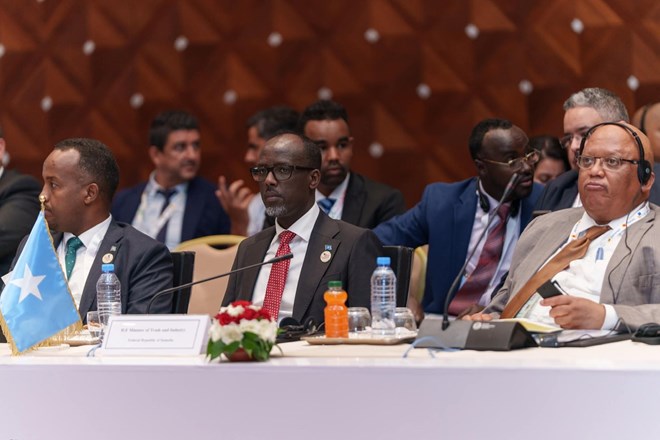
Sunday September 7, 2025

Mogadishu (HOL) — Somalia’s Minister of Commerce and Industry, Mohamoud Adam Geesood, joined counterparts from across the continent this week at the Intra-African Trade Fair (IATF 2025) in Algiers, where leaders renewed calls to accelerate the African Continental Free Trade Area (AfCFTA).
The ministerial dialogue took place alongside Africa’s largest trade and investment gathering, which has drawn more than 35,000 delegates, 2,000 exhibitors, and delegations from 140 countries. Organizers expect deals worth over $44 billion to emerge from the fair, highlighting its role as both a marketplace and a political platform for advancing integration under the AfCFTA.
At the session, ministers stressed the urgency of harmonizing trade regulations, cutting non-tariff barriers, and fast-tracking protocols on goods, services, investment, and digital trade. AfCFTA Secretary-General Wamkele Mene warned that global economic nationalism and protectionist policies make it critical for Africa to build a strong internal market. He pointed to a 12.5 percent rise in intra-African trade in 2024, surpassing $220 billion, with manufactured goods such as cars, chemicals, and processed foods leading the surge, as evidence that the continent is beginning to shift from raw material exports toward industrialization.
For Somalia, which joined the AfCFTA in 2023, participation in the dialogue reflects efforts to align national trade policy with continental frameworks. Officials in Mogadishu say the deal offers opportunities to expand market access, attract investment, and generate jobs, particularly for the country’s young workforce.
The Algiers gathering also spotlighted initiatives tied to the trade fair. Innovation debates launched at the African Research and Innovation Hub focused on linking scientific research with industry and fostering South-South cooperation, with Algeria pledging to support young researchers and entrepreneurs. Other platforms spotlighted Africa’s creative industries, the automotive supply chain, and the role of the diaspora in technology transfer.
The week-long event opened with a presidential summit hosted by Algeria’s President Abdelmadjid Tebboune and attended by former Nigerian leader Olusegun Obasanjo, AfCFTA champion Mahamadou Issoufou, and heads of state from Africa and the Caribbean. High-profile figures such as World Trade Organization Director-General Ngozi Okonjo-Iweala and Nigerian industrialist Aliko Dangote are among those shaping discussions on Africa’s path to economic transformation.
Trade ministers concluded the dialogue with a pledge to strengthen institutional readiness and involve the private sector in advancing the AfCFTA, which now covers more than 1.4 billion people and a combined GDP of $3.4 trillion. Mene added that new mechanisms such as the AfCFTA Adjustment Fund and the Single African Air Transport Market are essential to sustain momentum and reduce structural bottlenecks.






